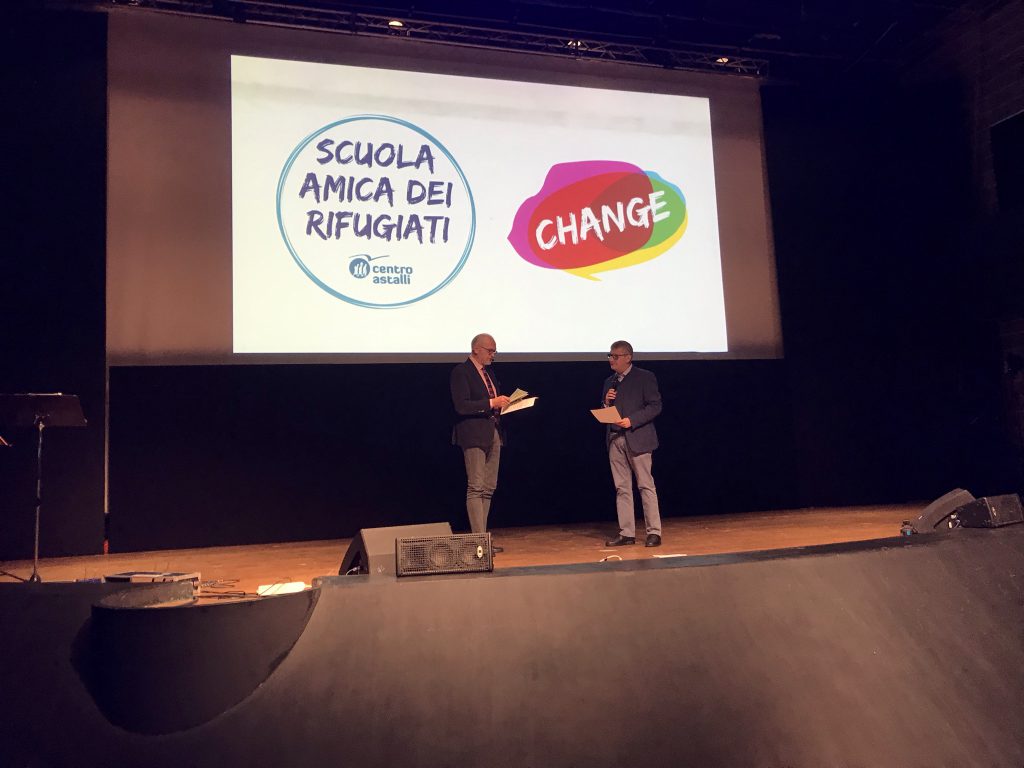Hundreds of high school students from 15 Italian cities were the protagonists of “Writing does not go into exile”, the great party organized by Centro Astalli, in collaboration with Rai Scuola (media partner of the event).
The event, held on 27 October at the Auditorium del Massimo in Rome, broadcasted online on the Rai Scuola website, was the opportunity to reward the winning students of high schools of the 15th edition of the literary competition “Writing does not go into exile ”, and the winning students of middle schools, of the VII edition of the literary competition“ We write in color”.
More than 200 stories arrived to Centro Astalli, from more than 100 Italian institutes, envolved in the educational projects “Windows”, part of the European project CHANGE, and “Incontri”.
Thanks to these projects, more than 15,000 students every year have the opportunity to meet refugees or faithful of other religions in the classroom, and to hear their stories.
These essays written by students are an attempt to understand the lives of others or to tell their own immigration experience as second generation. They are the attempt to listen to the life of others to tell it. As an Indian proverb says: Before judging someone you have to walk two months in their moccasins.
The students involved did an exercise in imagination and identification, trying to put themselves in the shoes of a refugee and trying to write stories full of empathy, through which the winners were able to give voice, with passion and delicacy, to many issues such as forced migration, the trafficking of migrant women, the exploitation of farm workers, the violation of human rights.
At the awarding of the winners and Student Ambassadors of CHANGE partecipated many guests from the world of culture, entertainment and sport who launched their appeal for an inclusive society where diversity can be a value. All the winners students and ambassadors were rewarded with a backpack of books, offered by the Centro per il Libro of the Minister of Italian Culture, Sinnos Editrice and the Rai Radio 3 program Fahrenheit. The winning stories were published in a collection edited by Centro Astalli, distributed to schools and which can be consulted on www.centroastalli.it. Here you can also find the graphic novel “Strade di cicatrici”, inspired by the story of Alice Formica, student of the Liceo Vittorio Veneto in Milan, first place in this 15th edition of the competition.
The event was also an opportunity to recognize the title of Student Ambassadors of the CHANGE European project to all the winners and students who have taken part in the JRS Europe project in the last two years and to launch the Italian version of the final video of the CHANGE project.
In addition, 16 institutes have received the certificate of “Refugee friendly school” recognized by Centro Astalli. They are Italian middle and high schools that during the academic year have promoted among students the creation of awareness-raising and active citizenship initiatives, to create a more just, more open and more welcoming society.
LA SCRITTURA NON VA IN ESILIO: LA GRANDE FESTA DEGLI STUDENTI AMBASCIATORI DI CHANGE
Centinaia di studenti delle scuole superiori di oltre 15 città italiane sono stati i protagonisti de “La scrittura non va in esilio”, la grande festa realizzata dal Centro Astalli in collaborazione con Rai Scuola (media partner della manifestazione). L’evento, realizzato lo scorso 27 ottobre presso l’Auditorium del Massimo a Roma e trasmesso online sul sito di Rai Scuola, è stata l’occasione per premiare gli studenti vincitori della XV edizione del concorso letterario per le scuole superiori “La scrittura non va in esilio” e della VII edizione del concorso letterario per le scuole medie “Scriviamo a colori”. Sono stati più di 200 infatti i racconti inviati negli scorsi mesi da parte degli studenti di oltre 100 istituti italiani che hanno partecipato ai progetti didattici “Finestre”, parte del progetto europeo CHANGE, e “Incontri”, attraverso i quali oltre 15mila studenti l’anno hanno la possibilità di incontrare rifugiati e fedeli di altre religioni e di ascoltare le loro storie.
Questi racconti sono il tentativo di capire le vite altrui o di raccontare la propria esperienza di immigrazione come stanno cominciando a fare i giovani di seconda generazione. Sono il tentativo di ascoltare la vita degli altri per raccontarla. Come dice un proverbio indiano: Prima di giudicare qualcuno devi camminare due mesi nei suoi mocassini.
Gli studenti coinvolti hanno fatto un esercizio di immaginazione e immedesimazione, provando a mettersi nei panni di un rifugiato e a scrivere una storia. Ne sono nati racconti pieni di empatia, attraverso i quali i vincitori hanno saputo dare voce con passione e delicatezza a tante tematiche come la migrazione forzata, la tratta delle donne migranti, lo sfruttamento dei braccianti agricoli, la violazione dei diritti umani.
La premiazione ha visto la partecipazione di tanti ospiti del mondo della cultura, dello spettacolo, e dello sport che si sono espressi a favore di una società inclusiva in cui la diversità sia un valore.
Tutti i vincitori sono stati premiati con uno zaino di libri offerti dal Centro per il Libro, Sinnos Editrice e il programma Fahrenheit di Rai Radio 3.
I racconti vincitori sono pubblicati in una raccolta a cura del Centro Astalli, distribuita alle scuole e che è possibile consultare su www.centroastalli.it, dove si può trovare anche la graphic novel “Strade di cicatrici”, ispirata al racconto di Alice Formica, studentessa del Liceo Vittorio Veneto di Milano, primo classificato di questa XV edizione del concorso.
L’evento è stato anche l’occasione per riconoscere il titolo di Student Ambassadors del progetto europeo CHANGE a tutti i vincitori e agli studenti che hanno preso parte al progetto del JRS Europa negli ultimi due anni e per lanciare la versione italiana del video finale del progetto CHANGE. Inoltre 16 istituti hanno ricevuto l’attestazione di Scuola amica dei rifugiati riconosciuta dal Centro Astalli. Si tratta di scuole medie e superiori del territorio nazionale che nel corso dell’anno scolastico hanno promosso tra gli studenti la realizzazione di iniziative di sensibilizzazione e di cittadinanza attiva con l’obiettivo di creare una società più giusta, più aperta e più accogliente.

